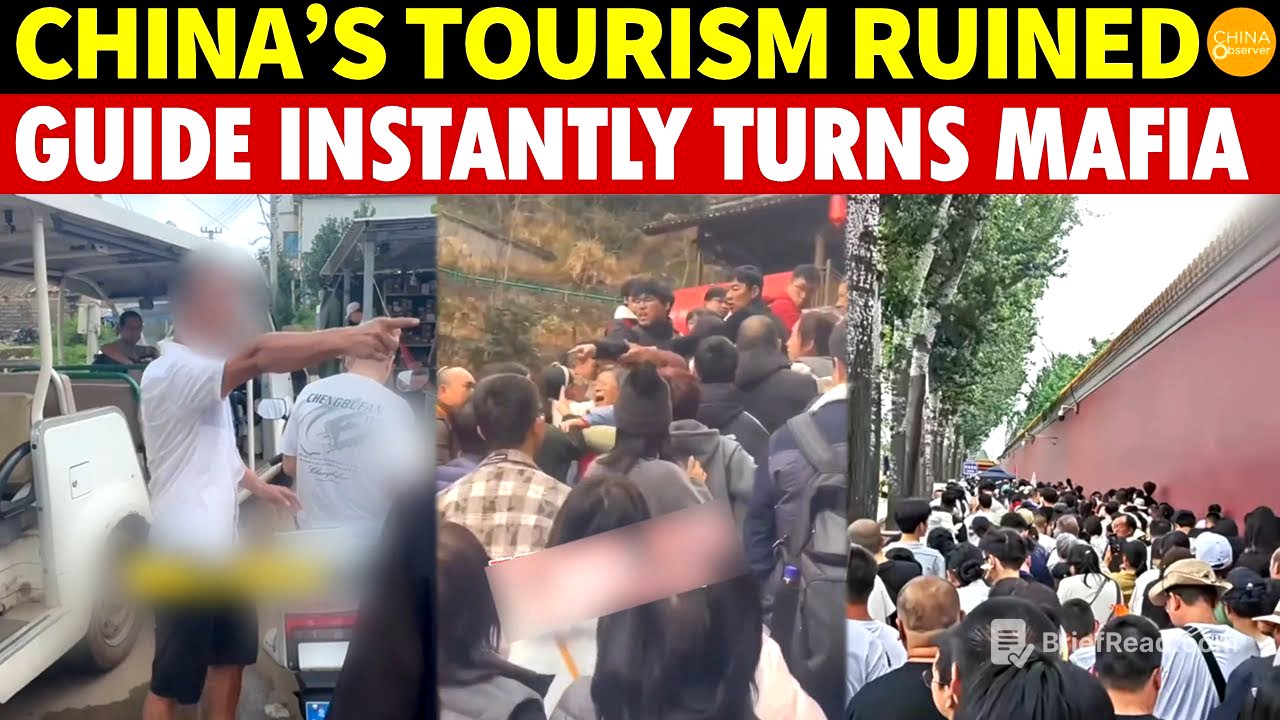TLDR;
The video discusses the widespread issue of forced spending in China's tourism industry, where tourists are coerced into making purchases through various means, including threats and deceptive practices. This problem stems from structural issues within the industry, such as inconsistent regulatory enforcement, local governments' shared interests with tourism businesses, and the pursuit of economic data over quality experiences. The consequences include eroded tourist confidence, damage to China's tourism image, and disproportionate impact on vulnerable groups.
- Forced spending is rampant in China's tourism industry.
- Regulatory enforcement is inconsistent and often performative.
- Local governments prioritise economic data and social stability over quality tourism.
- Tourists are often trapped in a cycle of low-cost tours and forced consumption.
- The issue erodes tourist confidence and damages China's tourism image.
Introduction: Forced Spending in China's Tourism Industry [0:00]
Forced spending has become a significant issue in China's tourism sector, leading to dissatisfaction among tourists. Guides often pressure tourists to spend money at designated shops, sometimes resorting to threats of being left stranded or facing verbal abuse if they don't comply. This practice is so pervasive that many believe it is ruining the tourism experience in China.
Examples of Forced Spending and Overcharging [0:48]
The video presents several examples of tourists being overcharged or forced to spend money. One incident involves a restaurant charging an exorbitant price for fish soup, while another recounts a group tour where tourists were pressured to buy jewellery, silk, and tea. Guides use tactics such as mocking tourists who don't spend enough and even threatening their safety.
Low-Cost Tours and Shopping Traps [5:24]
Low-cost tours operate by attracting customers with very low prices and then compensating through commissions from shopping stops. Guides, who often earn little or no base salary, rely on these commissions, turning tourists into easy targets. Attractions become shopping traps, where tourists are pressured to buy overpriced goods.
Forced Spending at Major Attractions [7:47]
Forced spending isn't limited to low-cost tours; it also occurs at major attractions. Examples include visitors being required to buy show tickets to enter an attraction and tourists being trapped in stores until they make a purchase. These practices are widespread and contribute to a negative perception of Chinese tourism.
Government Response and Enforcement [8:47]
While the Chinese government has issued regulations against forced shopping, enforcement is often inconsistent. Authorities respond to incidents with high-profile measures, such as fines and license revocations, but these are often temporary. Travel agencies and shops often rebrand and resume their practices once the attention fades.
Shared Interests and Economic Priorities [12:51]
Local governments often have shared interests with tourism businesses, promising visitor flow and sales volumes to attract investment. This can lead to cautious enforcement to avoid harming the investment environment. The pursuit of economic data, such as tourist numbers and revenue, often takes precedence over the quality of the tourist experience.
Consequences and Contradictions [14:42]
The forced consumption model helps maintain social stability and employment by providing jobs in the tourism sector. It also channels social tensions towards the market, with tourists directing complaints at travel agencies rather than the government. However, this model erodes tourist confidence and damages China's tourism image in the long term.
The Cycle of Forced Consumption [16:01]
Limited funds lead tourists to choose cheaper tours, which then rely on forced consumption to make up the difference. This creates a negative cycle where visitor experiences worsen, making them less willing to spend in the future. The problem disproportionately affects vulnerable groups, such as elderly and rural tourists.









